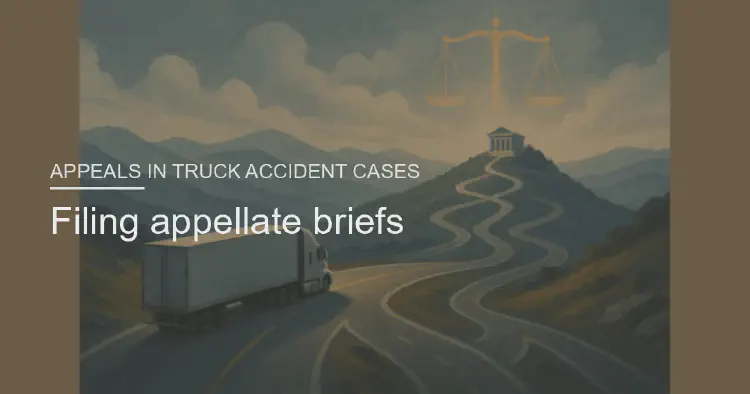Filing appellate briefs
Appellate briefs are the cornerstone of any appeal in a truck accident case. They outline the legal errors made during trial and present arguments to persuade appellate judges to overturn or modify the lower court’s decision.
- Truck Accident Law Team
- 2 min read
Article 2 of 6 in Appeals in Truck Accident Cases/

Filing Appellate Briefs in Truck Accident Cases
Purpose of Appellate Briefs
- Provide a written argument explaining why the trial court’s decision should be affirmed or reversed.
- Serve as the primary source of information for appellate judges, who rarely review new evidence.
Contents of an Appellate Brief
- Cover Page and Table of Contents
- Identifies parties, case number, and court.
- Statement of Jurisdiction
- Explains why the appellate court has authority to hear the case.
- Statement of Issues
- Lists specific legal errors being challenged.
- Statement of the Case and Facts
- Summarizes the trial court proceedings and relevant facts.
- Argument Section
- Cites statutes, case law, and trial record to support claims of error.
- Standard of Review
- Explains the level of scrutiny the appellate court should apply.
- Conclusion and Relief Requested
- States the outcome sought, such as a new trial or modified damages.
Process of Filing
- Strict deadlines apply (often 30–60 days after judgment).
- Briefs must follow precise formatting rules set by appellate courts.
- Plaintiffs and defendants each file briefs:
- Appellant’s Brief: Filed by the party appealing, outlining trial errors.
- Appellee’s Brief: Filed by the opposing party, defending the trial court’s decision.
- Reply Brief: Optional, allows appellant to counter arguments from the appellee.
Importance in Truck Accident Appeals
- Judges rely heavily on briefs, as appeals rarely involve live testimony.
- A well-written brief can sway appellate judges even before oral arguments.
- Briefs frame the entire appeal and often determine its outcome.
Challenges
- Briefs must be concise yet comprehensive, covering complex trucking regulations and trial errors.
- Failure to follow court rules can result in rejection of the filing.
Summary: Filing appellate briefs is a critical step in truck accident appeals. These documents present legal arguments, highlight trial errors, and guide appellate judges in determining whether the verdict should stand or be overturned.
You might also like:
- Tags:
- Trucking Regulations
- Trial Court
- Case Law
- Appellate Courts
- Trial Errors
- Complex Trucking
- Importance Truck
- Appellate Court
- Appellate Judges
- Cases Purpose
- Court Authority
- Support Claims
- Plaintiffs Defendants
- Oral Arguments
- Rely Heavily
- Court Decision
- Opposing Party
- Legal Errors
- Importance Truck Accident
- Trial Court Decision
- Complex Trucking Regulations
- Truck Accident Appeals
- Step Truck Accident
- Highlight Trial Errors
- Critical Step Truck